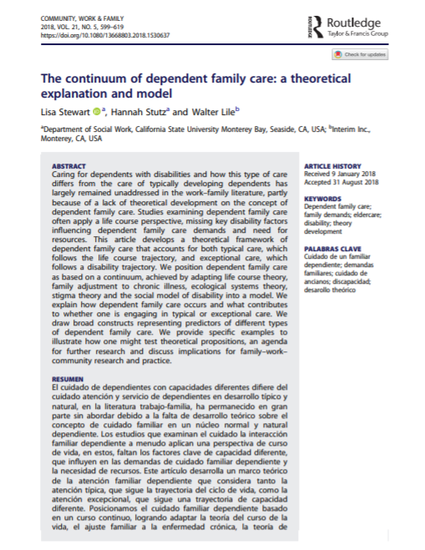
Article
The Continuum of Dependent Family Care: A Theoretical Explanation and Model
Community, Work & Family
(2018)
Abstract
Caring for dependents with disabilities and how this type of care differs from the care of typically developing dependents has largely remained unaddressed in the work-family literature, partly because of a lack of theoretical development on the concept of dependent family care. Studies examining dependent family care often apply a life course perspective, missing key disability factors influencing dependent family care demands and need for resources. This article develops a theoretical framework of dependent family care that accounts for both typical care, which follows the life course trajectory, and exceptional care, which follows a disability trajectory. We position dependent family care as based on a continuum, achieved by adapting life course theory, family adjustment to chronic illness, ecological systems theory, stigma theory and the social model of disability into a model. We explain how dependent family care occurs and what contributes to whether one is engaging in typical or exceptional care. We draw broad constructs representing predictors of different types of dependent family care. We provide specific examples to illustrate how one might test theoretical propositions, an agenda for further research and discuss implications for family-work-community research and practice.
Disciplines
Publication Date
November 21, 2018
DOI
10.1080/13668803.2018.1530637
Citation Information
Lisa Stewart, Hannah Stutz and Walter Lile. "The Continuum of Dependent Family Care: A Theoretical Explanation and Model" Community, Work & Family Vol. 21 Iss. 5 (2018) p. 599 - 619 Available at: http://works.bepress.com/lisa_stewart/1/
